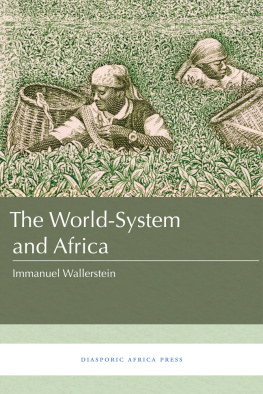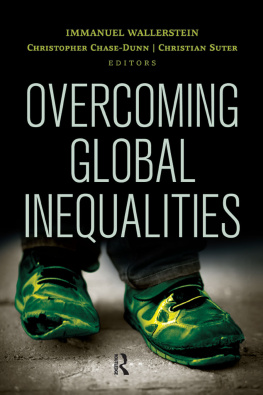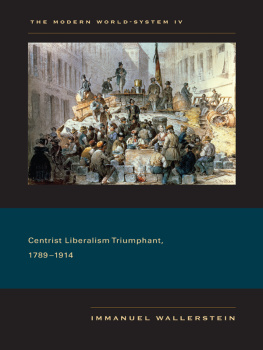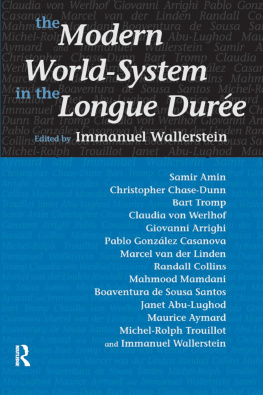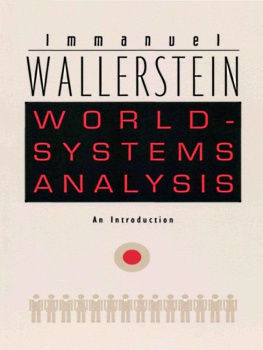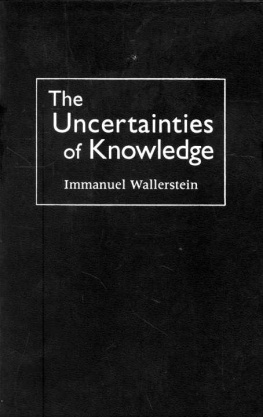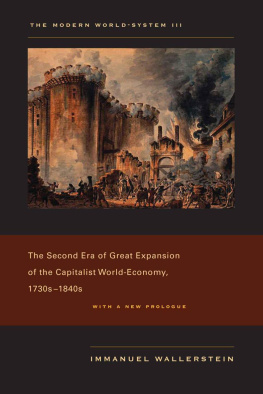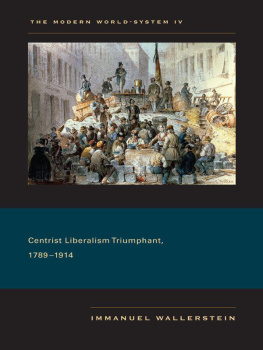Introduction
Thirty years ago, I published a collection of my essays on Africas role in the world-economy. It was entitled Africa and the Modern World. Much has happened since then both in Africa and in the world-system as a whole. It seems time to try to group together another set of essays.
In this collection, I shall discuss three matters. The first is what I have been calling the structural crisis of the modern world-system. We are, I believe, in a singular transition from the capitalist system which has shaped the modern world for almost 500 years to its successor system or systems. This structural crisis will continue to go on for another 30 to 40 years. There are two possible outcomes, one better and one worse than the system in which we have been living. It is impossible to predict the outcome, but we can analyze the struggle and seek to affect it. I have written four essays, one jointly with William G. Martin, in which I seek to analyze the impact of this worldwide structural crisis on Africa.
I then turn to identity politics, a political stance that came to prominence in the last thirty years. Not unique to Africa, identity politics has become central to political struggles everywhere in the world-system. I have written four essays in which I consider the world-system context for the African dilemmas posed by this approach.
Finally, in six essays, I reflect on African thinkers analyses of current affairs both in the world-system and in Africa.
If Africa is going to play an appropriate and significant role in resolving the structural crisis of the modern world-system, it is crucial that there continue to be a well-informed and intellectually relevant debate about the issues involved, the moral choices to be made, and the political strategies to follow. I offer this collection as my contribution to the debate. It comes from someone who is not an African but who has been involved in writing about Africa for over seventy years and who has learned much of what he claims to know from his involvement in the region.
This book is a publication of
Diasporic Africa Press
New York | www.dafricapress.com
Copyright @ Diasporic Africa Press 2017
All rights reserved. No part of this publication may be reproduced or distributed in any form or by any means, or stored in a database or retrieval system, without the prior written permission of the publisher.
Library of Congress Control Number: 2016952370
ISBN-13 978-1-937-30652-6 (pbk.: alk paper)
ISBN-13 978-1-937306-53-3 (ebook)
Acknowledgments
The author and publisher thank the following for permission to reproduce the previously published essays in the collection: How Much Change Since Independence? in G.M. Carter & P. O'Meara, eds., African Independence: The First Twenty-Five Years. Bloomington, IN: Indiana University Press, 1985, 330-338; (with William G. Martin), Southern Africa in the World-Economy, 1870-2000, in R. E. Mazur, ed., Breaking the Links. Trenton, NJ: Africa World Press, 1990, 99-107; The ANC: Past and Present of Liberation Movements, Economic and Political Weekly, XXXI, 39 (Sept. 28, 1996), 2695-2699; What Hope Africa? What Hope the World?" in A. O. Olukushi & L. Wohlgemuth, eds., Road to Development: Africa in the Twenty-first Century. Uppsala: Nordiska Afrikainstitutet, 1995, 68-84; Construction of Peoplehood: Racism, Nationalism, Ethnicity, Sociological Forum, II, 2, 1987, 373-388; After Developmentalism and Globalism, What?" Social Forces, 2, 2005, 321-336; Naming Groups: The Politics of Categorizing and Identities, Review, XXX, 1, 2007, 1-15; Political Construction of Islam, in K. Samman & M. Al-ZoBy, eds., Islam and the Orientalist World-System. Boulder, CO: Paradigm, 2008, 25-36; A Comment on Epistemology: What is Africa?" Canadian Journal of African Studies, XXII, 2, 1988, 331-333; "The Evolving Role of the Africa Scholar on African Studies, in Immanuel Wallerstein, Africa and the Modern World. Trenton, NJ: Afrika World Press, 1986, 3-9; Basil Davidson's African Odyssey, Third World Review, I, 3, 1985, 8-9; Walter Rodney: The Historian as Spokesperson for Historical Forces, American Ethnologist, XIII, 2, May 1996, 330-337; Oliver Cox as World-Systems Analyst, in H. H. Hunter, Sociology of Oliver C. Cox, Vol. II. Stamford, CT: JAI Press, 2000, 171-183; Reading Fanon in the Twenty-first Century, New Left Review, n.s., No. 57, May-June 2009, 117-129.
Contents
1
Africa and the World System : How Much Change since Independence?
There is little argument among either Africans or Africa scholars about the position of Africa in the world system as of circa 1945. With the exception of Egypt, Ethiopia, Liberia, and South Africaall founding members of the United Nationsthe entire continent was composed of colonial territories, in which formal sovereignty lay in the hands of five European statesGreat Britain, France, Belgium, Portugal, and Spain.
The year 1957 is generally considered a key date in modern African political history. It is the year of Ghanas independence, that of the first African state south of the Saharain 1957 this distinction was still commonly made (and the Sudan was somehow considered north of the Sahara)to be proclaimed independent. The road to Ghanas independence may be traced, in constitutional terms, to the Report of the Committee on Constitutional Reform in 1949 (known as the Coussey Commission). They recommended the form of local self-government under which the CPP and Kwame Nkrumah were to come to power in 1951. If one looks at this report, one finds in it an Appendix which contains an extract from an article circulated at the request of a member of the Committee. The article is by Felix S. Cohen and is called Colonialism: A Realistic Approach. It is a very balanced appraisal. On the one hand, Cohen notes the suspiciousness with which one should approach the good intentions of the colonial power.
Colonial status is commonly justified today as a temporary institution designed to give way, in the long run, either to independence or to assimilation. The only difficulty with this theory is that, as John Maynard Keynes has observed, in the long run we are all dead. Certainly the process of terminating a colonial status in an orderly non-violent manner is one of the most difficult of political operations....
Returning to our principle of political realism, we may observe that not only in determining the existence or abandonment of colonial status but also in actually carrying out a pledge of freedom, the power of government is a corrupting force....
From this one may deduce that the carrying-out of a decision to relinquish power cannot safely be left to the wielder of such power.
On the other hand, Cohen expresses his doubts about the leadership of the aborigines.
Cynicism, however, must not be one-sided. The diseases of colonialism are not limited to those who govern. Those who are governed develop equally stubborn and serious maladies. Chief among these maladies are: (1) native toadyism, in which the native politician secures crumbs of power by adopting the usual habits of lickspittles, sycophants, and courtesans; (2) blablaism, in which natives aspiring to posts of leadership among their people, having no opportunity to demonstrate capacities for non-vocal behaviour, are appraised, selected, and bred solely on the basis of the noises that come from their mouths; and (3) noitis, in which the patient, deprived of the opportunity of action, is reduced to a position of continuous objection to the course of administration.
A combination of the last two maladies generally produces a situation in which a depressed group will choose its leadership from those who most eloquently express the common distrust of the power that governs. To expect such a leadership to accept with joy promises of self-government, or of better conditions in the future, is childish. Apparently, however. Sir Stafford Cripps expected that Indian leaders who had attained their positions of leadership by warning their people not to trust the British, these warnings have been frequently substantiated by the course of events, could turn around to their followers and say, The promises which the British now make are to be believed. In all probability the only rational approach to this type of situation is the immediate transfer of new realms of responsibility to native control. Such a solution not only does away with the need for trust in promises but also inevitably modifies the character of the native leadership by instilling the habits, tests, and responsibilities of actual administration and thus replacing leaders-in-discourse with leaders-in-action.

